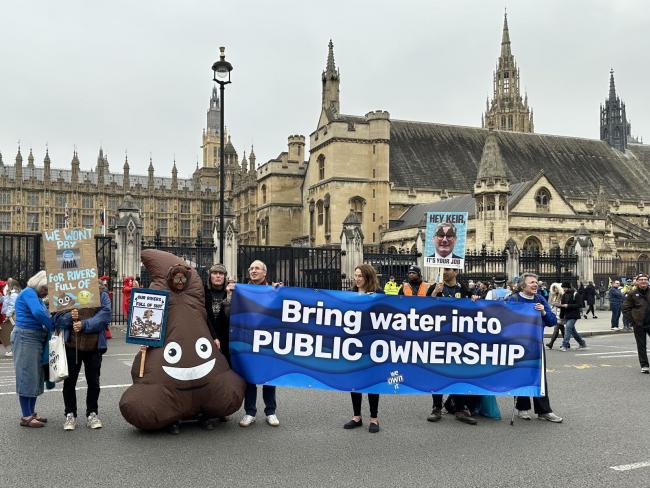13 August 2025

On the March for Water, London, November 2024. Photo Workers.
The water industry is a mess, saddled by debt and not providing adequate service on supply and sewage. The government’s latest efforts to resolve this haven’t provided an answer.
A report on the water industry in England and Wales was published in July. It has been severely criticised for failing to consider ending the disastrous private company stewardship of the industry in England and returning water to public ownership.
Concerns
The Labour government set up the Independent Water Commission in response to concerns about the way in which private companies have managed their finances, while frequently discharging raw sewage into streams and rivers.
Led by banker John Cunliffe, the commission concluded in its report that the much discredited current regulator Ofwat (the Water Services Regulation Authority) should be abolished, a recommendation that the government has confirmed it will accept. Ofwat has been accused of backing the interests of the water companies against the interests of the people.
Greed
However, the commission’s report has itself been strongly criticised by campaigners. High-profile musician and water activist Feargal Sharkey said that the report “blatantly ignores that this is an issue about corporate greed, manipulation, profiteering financial engineering, £74 billion of debt and £84 billion of dividends that these companies have ram-raided.”
This situation pre-dates the present government. As reported in Workers January/February 2022 edition, a 2021 Greenwich University study, showed that whilst massive debts have been built up by water companies, even more has been paid out in shareholders dividends. At the same time senior water executives have taken massive bonuses and salaries.
Mushroomed
Since then, both debt and dividend payments have mushroomed while more and more sewage is discharged into Britain’s rivers.
‘It does not consider the option of re-nationalising water.’
The commission’s report does not consider the option of re-nationalising water. Before commissioning the report, the government ruled this option out, stating that to do so would be too expensive and wouldn’t necessarily lead to improvements.
Limited
Its brief was to look at regulation of the water industry, effectively assuming that the problem is limited to effective regulation. So the report talks about a new regulator “having more say in who owns water companies”, a “new regime to make senior executives directly accountable”, “better oversight of company finances” and new measures to attract long term investors.
In short, the report appears to support the ability of private companies to make big profits from a monopoly public service, while water consumers will pay much bigger bills to fund badly needed investment.
